AI on the S’pore menu: F&B firms use tech to suggest drinks for health, create salad bowls and more
Sign up now: Get ST's newsletters delivered to your inbox
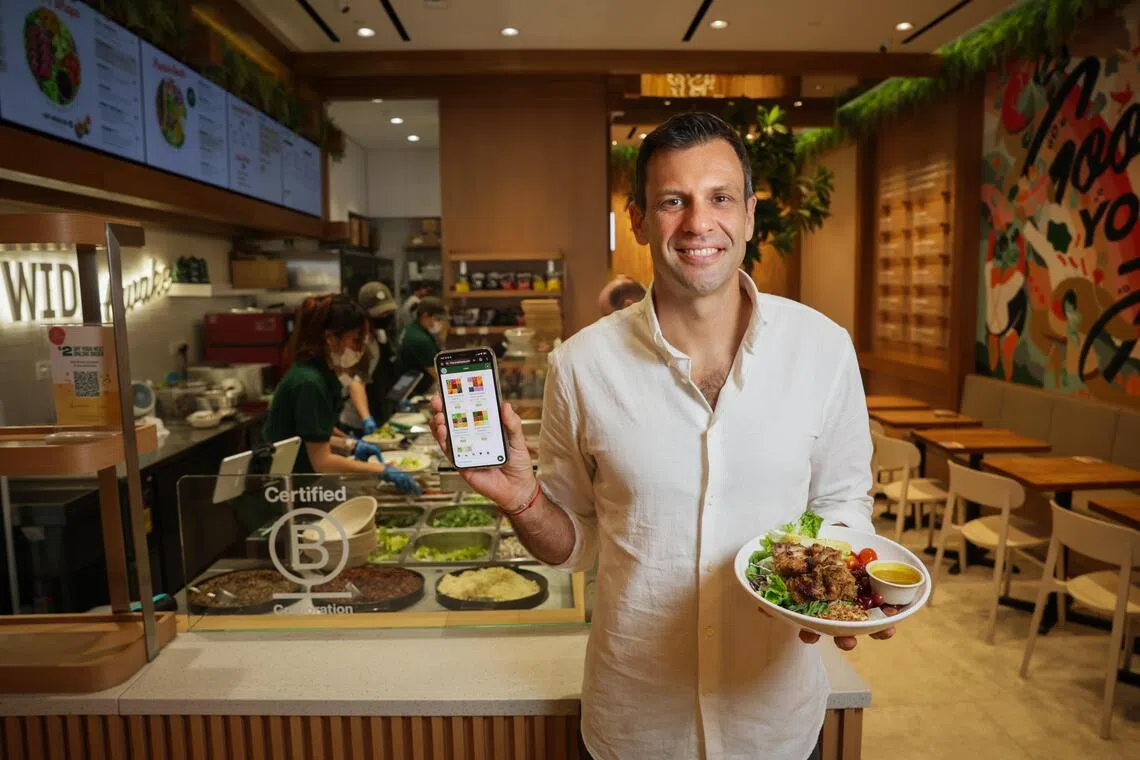
Mr Adrien Desbaillets, chief executive and co-founder of SaladStop! Group, showing its GenAI assistant Lulu on his mobile phone and its Lemongrass Chicken Bowl.
ST PHOTO: GIN TAY
Follow topic:
- Luli Singapore uses AI mirrors to scan faces, providing TCM-based health reports, recommending suitable herbal drinks to promote self-care and functional beverage choices.
- SaladStop! is launching Lulu, a generative AI assistant, in November, enabling customers to customise salad bowls via their mobile phones for personalised, healthy eating.
- Other F&B operators are using AI to streamline operations, from AI avatars at Kopitiam guiding diners to ChefGenie's autonomous cooking, enhancing efficiency without replacing staff.
AI generated
SINGAPORE – Cannot decide what drink to get? Just look in the mirror.
At Chinese tea brand Luli Singapore, a facial scan via its artificial intelligence (AI) mirror can tell you what herbal brew to order.
At its Marina Square outlet, two AI-powered mirrors scan a user’s face and tongue to generate a body constitution report grounded in traditional Chinese medicine (TCM).
Ms Jovalene Teo, 44, chief executive of Luli Singapore, who procured the two machines from China, says this is a fun, interactive way to help people be aware of their health and introduce them to TCM.
It is still early days, but a growing number of operators are tapping AI to streamline operations and enhance the diner experience.
Over at Kopitiam @ Mapletree Business City, diners meet Kimberly, an AI avatar on a display screen, at the entrance. She offers multilingual help, information on seat availability and stall recommendations.
Mr Aaron Chia, 42, lead for business support at FairPrice Food Services, which runs the foodcourt, says: “We wanted to create a digital concierge that could make the foodcourt experience friendlier, faster and more interactive, while preserving the welcoming spirit of our Kopitiam outlets.”
For home-grown soup chain The Soup Spoon, AI is working behind the scenes to collate and analyse data.
“It enables senior management to have eyes on the ground without visiting each outlet in person,” says co-owner Andrew Chan, 51. The use of an AI engine turns daily outlet input into management insights.
In November, healthy-eating chain SaladStop! will roll out Lulu, a generative artificial intelligence (GenAI) assistant that helps customers design their salad bowl and answer their questions via the brand’s ordering web app.
“We are using AI to create a more personalised and engaging experience, so every order feels like it is designed specifically for that person,” says chief executive Adrien Desbaillets, 44.
Others are using AI to improve automated cooking capabilities. ChefGenie may look like a vending machine, but it is an AI-powered autonomous kitchen that prepares freshly cooked meals on demand.
“It’s not about replacing chefs. It’s about augmenting the kitchen,” says Mr Sky Goh, 48, vice-president of business and operations at home-grown tech company Aikit, which is behind ChefGenie.
“With automation, we can maintain precision, consistency and efficiency without being limited by manpower or space.”
Here are five ways AI is used in the food and beverage (F&B) sector to improve customer experience and operational efficiency.
SaladStop!: GenAI assistant for salad customisation
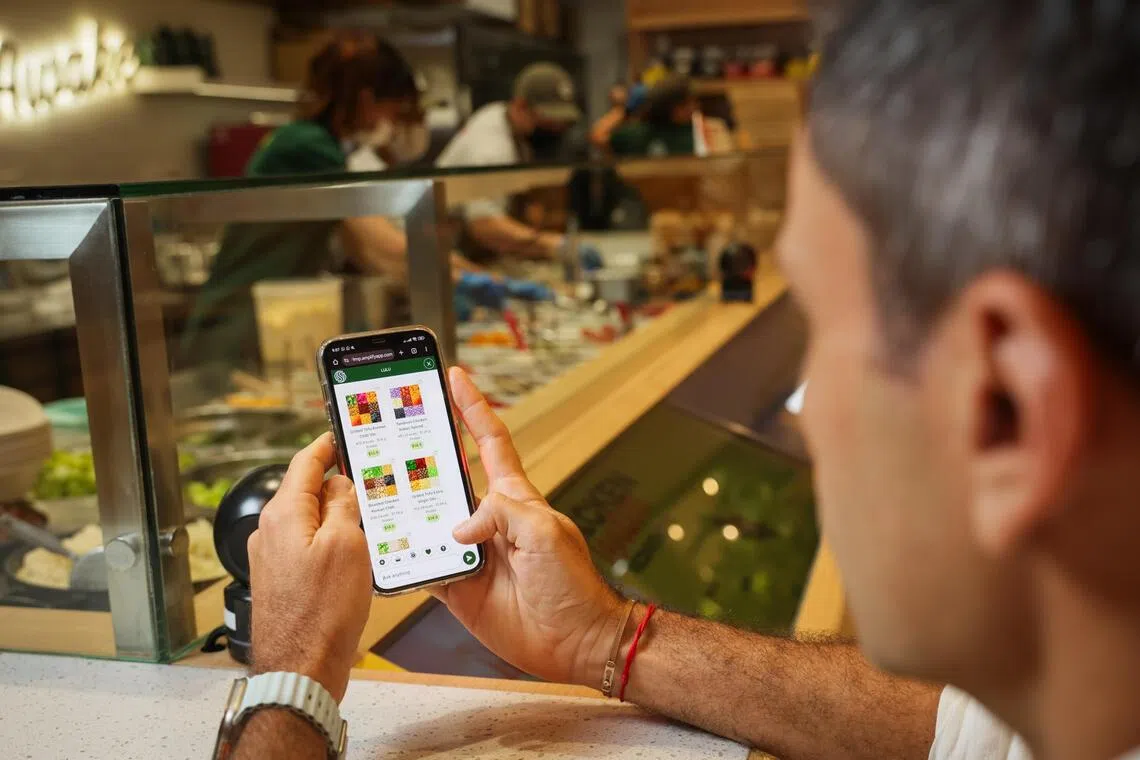
Mr Adrien Desbaillets, chief executive and co-founder of healthy-food chain SaladStop! Group, showing its GenAI assistant Lulu on his mobile phone.
ST PHOTO: GIN TAY
At SaladStop!, a new AI-powered assistant named Lulu will soon help diners build their own salad bowls and put in the orders for them.
The GenAI chatbot, set to launch in November, can take orders, customise bowls based on customer preferences and suggest ingredient combinations through a chat interface.
It will appear as a widget within SaladStop!’s existing ordering web app and marks the next step in the home-grown chain’s long-term plan to make healthy eating easier and more intuitive.
Customers can interact with Lulu in two ways. The first is a guided mode, where Lulu asks a few short questions – whether they want something high in protein, low in calories or plant-based – before building the bowl step by step.
The second is a direct approach, where users can simply tell Lulu what they want. For example, someone might say: “Build me a bowl that’s under 800 calories, has at least 50g of protein and is Thai-inspired. I’m lactose-intolerant and I hate olives.”
Prices for Create Your Own salad bowls start at $10.90. Lulu interprets the prompt, curates the right combination of ingredients and builds the bowl on the spot. It is designed for both the explorer and the decisive customer – those who enjoy discovering new options and those who want their favourites instantly customised.
Founded in 2009, SaladStop! operates about 80 outlets worldwide, including 13 in Singapore. Lulu will be rolled out across all its Singapore outlets in November, then launch in 2026 in its overseas markets, which include the Philippines, Hong Kong, Indonesia, South Korea and Thailand.
Its journey into technology began nearly a decade ago, in 2016, when chief executive Adrien Desbaillets observed the growing demand for convenience and the rise of delivery platforms.
“We knew technology had to be a core part of our business strategy,” he says.
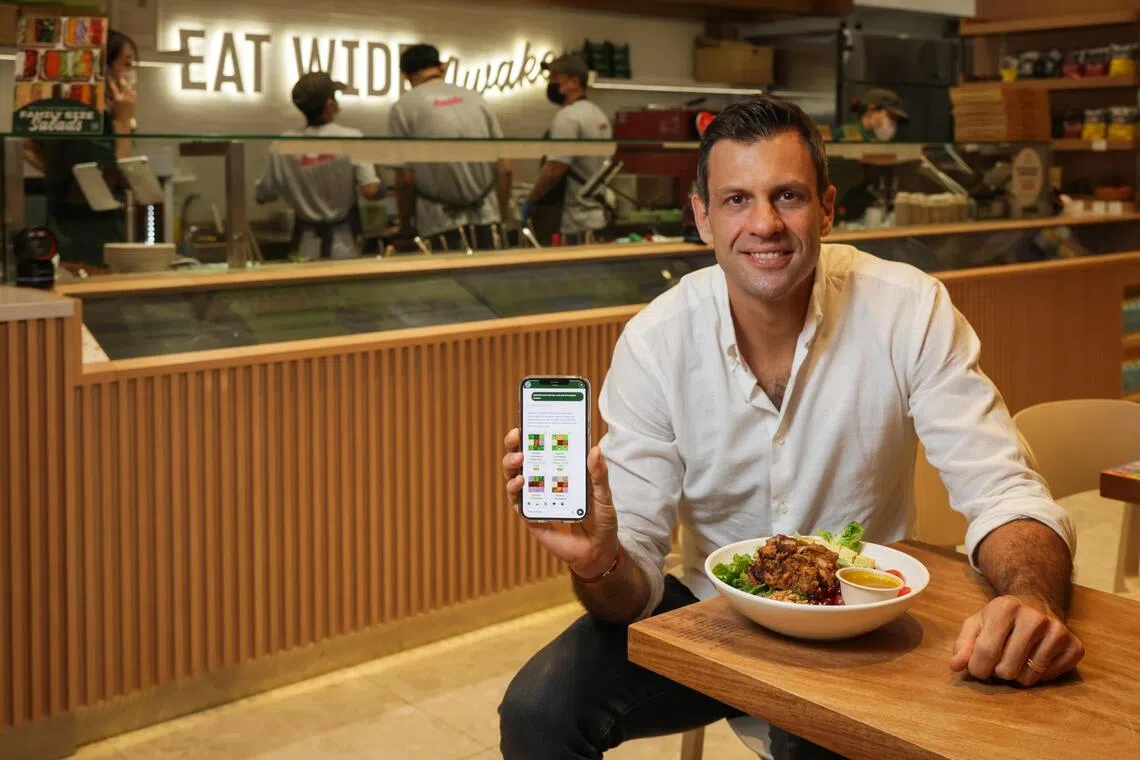
Mr Adrien Desbaillets says the role of AI is to enhance operations and diner experience, not to replace employees.
ST PHOTO: GIN TAY
By 2024, he saw that AI would become the next major catalyst for both personalisation and operational intelligence.
“Automation has always been about improving efficiency – reducing repetitive manual tasks and tightening workflows,” he says. “AI, on the other hand, allows us to go a level deeper by introducing intelligence and adaptability. It’s not just about automating what we already do, but it’s also about learning from patterns, predicting behaviours and making smarter decisions in real time.”
Lulu builds on that foundation. Developed with support from Amazon Web Services and the Infocomm Media Development Authority, the system draws on SaladStop!’s database of recipes and order histories. Once it launches, the estimated costs of operating it monthly could go up to $4,000 for a start.
With 60 ingredients to choose from, the possible combinations are many. Mr Desbaillets notes that this is where Lulu outperforms human employees. A part-time staff member may not be able to memorise all the combinations or recommend bowls based on nutritional value, but Lulu can.
“The level of detail and expertise with Lulu is far greater than what an in-store employee has,” he says. Lulu can even offer alternatives when certain ingredients do not pair well – such as falafel and Korean vinaigrette.
But far from replacing employees, Lulu is meant to support them. Staff can access Lulu through an internal interface to recommend bowls or suggest alternatives to customers. In-house chefs can use Lulu to identify emerging ingredient trends and develop new recipes.
While Lulu remains in beta testing ahead of its roll-out, Mr Desbaillets says it is part of SaladStop!’s long-term roadmap.
Down the road, the company plans to extend Lulu’s use into meal planning for business-to-business applications. For example, a personal trainer can use it to plan two weeks’ worth of high-protein meals for a client.
“That’s where we see the real long-term potential – Lulu as an intelligent layer that connects users, data and partners,” he says. “It is not just about finding solutions for today’s customers, but also about building brands and solutions for the next generation.”
Luli Singapore: AI brews a blend of technology and TCM traditions
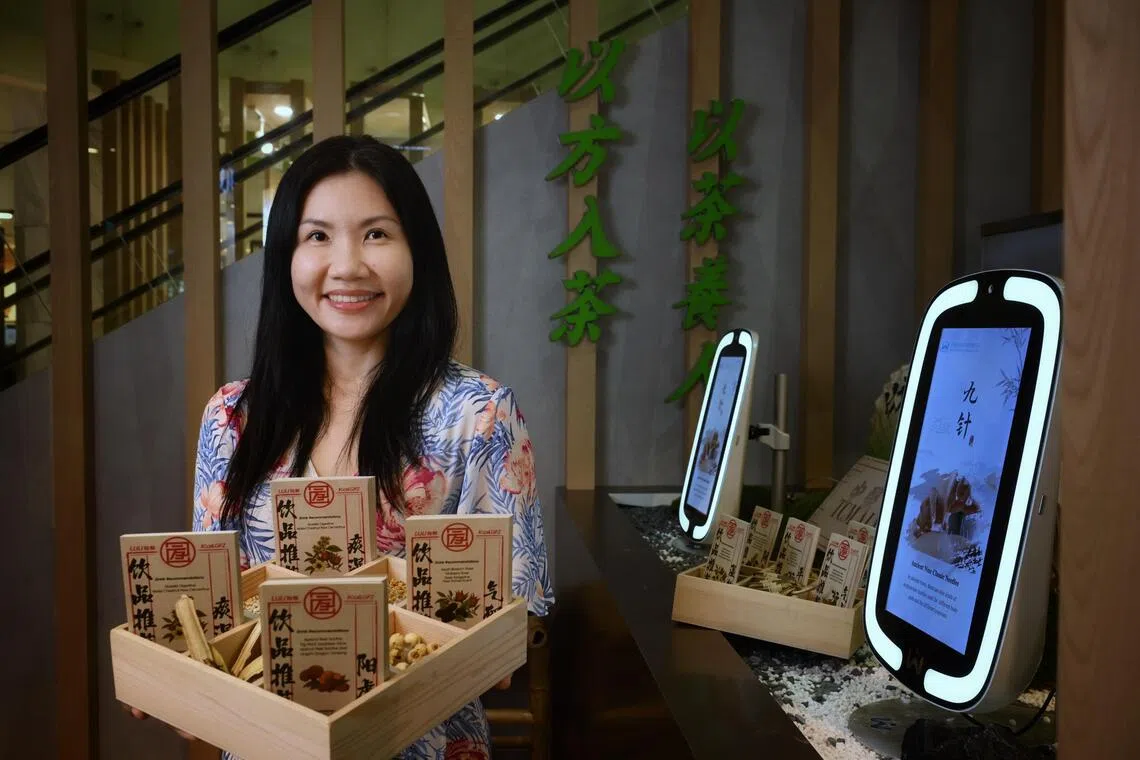
Ms Jovalene Teo, chief executive of Luli Singapore, with the AI mirrors at the tea brand’s outlet at Marina Square.
ST PHOTO: CHONG JUN LIANG
At Marina Square, customers at Chinese tea brand Luli Singapore can have their faces and tongues scanned before ordering their tea.
Two AI-powered mirrors at the store analyse a user’s face and tongue before generating a short body constitution report grounded in traditional Chinese medicine (TCM). Based on the reading, the system recommends a suitable herbal drink.
For example, Apricot Peel Soothe ($6.50) is recommended for a user who lacks yang energy. This may manifest in the user feeling cold easily, especially in the hands and feet, and having low energy, among other traits.
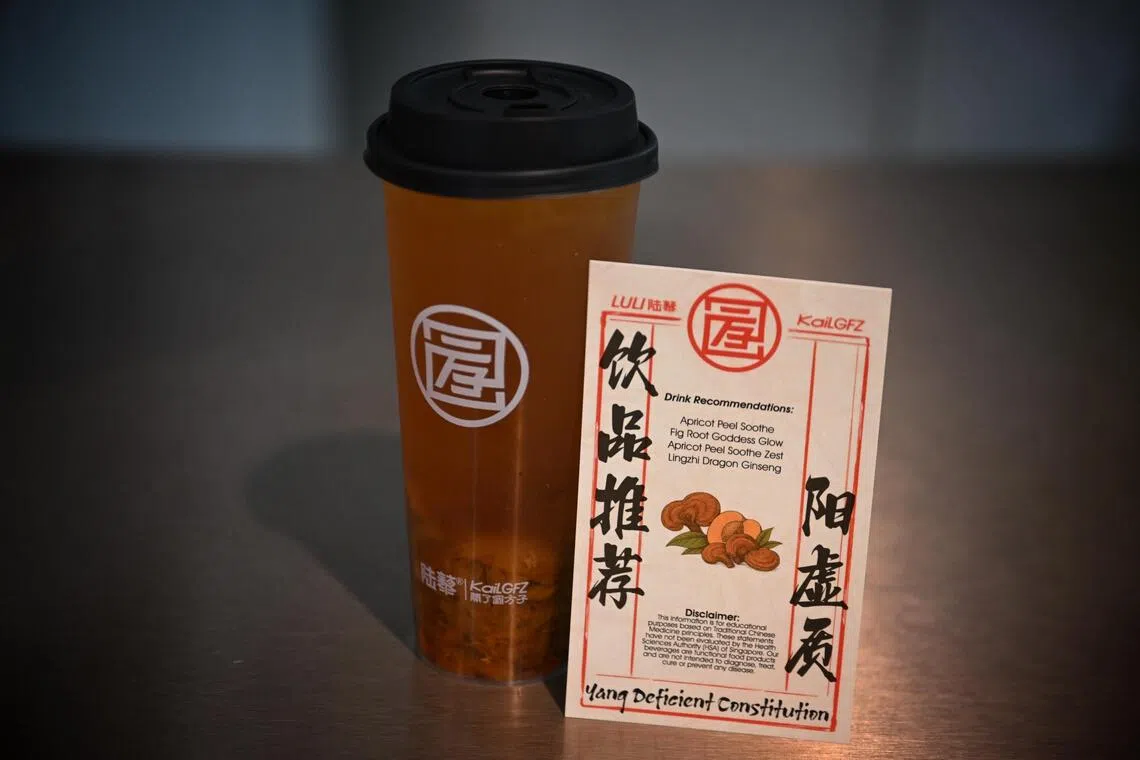
Apricot Peel Soothe is recommended for those with yang deficiency.
ST PHOTO: CHONG JUN LIANG
Ms Teo, the brand’s chief executive, imported the two machines from China to make the complex principles of TCM more accessible and engaging for a modern audience.
“It serves as an educational starting point for customers curious about their wellness,” she says.
At the same time, the AI mirrors promote Luli’s drinks by linking TCM with its menu.
“It is about choosing drinks based not just on taste, but also their properties. The mirrors help customers relate to our drinks as being functional, and not just for leisure.”
The hardware and core AI software were developed in China, in collaboration with TCM institutions such as Shanghai University of Traditional Chinese Medicine. She declined to reveal the cost of the machines.
The AI mirror scans the user’s face and tongue. The user then completes a brief questionnaire, including details of his or her height, weight, sleep quality and energy levels.
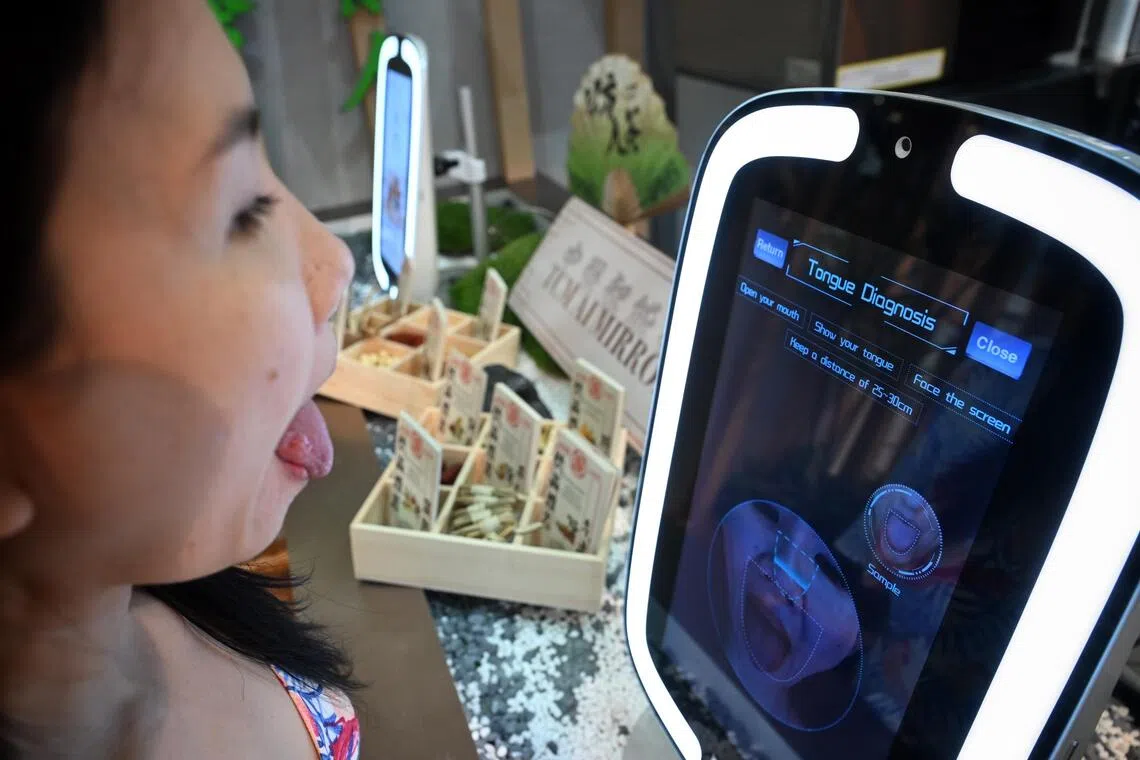
The AI mirror can deduce a user’s body constitution based on facial and tongue scans.
ST PHOTO: CHONG JUN LIANG
Based on TCM principles, the AI analyses facial features for signs related to key constitutions. For example, it might look for complexion cues associated with qi deficiency (dullness) or yin deficiency (flushed cheeks). A pale tongue may suggest yang deficiency, while a red tongue with a yellow coating could point to damp heat.
Apart from drink recommendations, the AI mirror also provides dietary suggestions, including recipes for herbal soups and exercises that may be beneficial for a certain constitution.
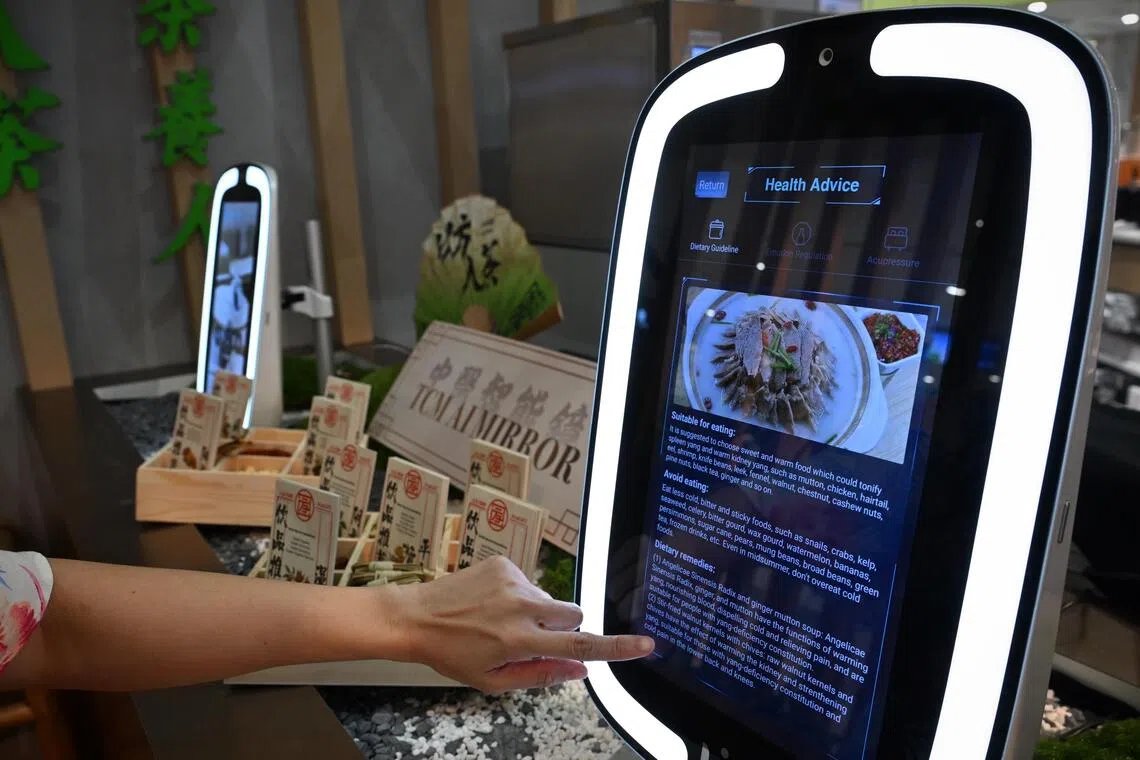
The AI mirror also recommends recipes featuring herbs to suit different body constitutions.
ST PHOTO: CHONG JUN LIANG
Still, Ms Teo emphasises that the primary function of the AI mirror is educational, to provide a preliminary, non-diagnostic analysis of a user’s body constitution based on TCM principles. It cannot replace an actual consultation with a certified TCM physician.
She adds: “In the competitive drinks market, having our AI mirror is a differentiator. Beyond just providing a product, we want to provide a more interactive customer experience. We want to give customers more value beyond our drinks, to encourage self-care and exploration of TCM.”
The Soup Spoon: AI stirs up smarter outlet management
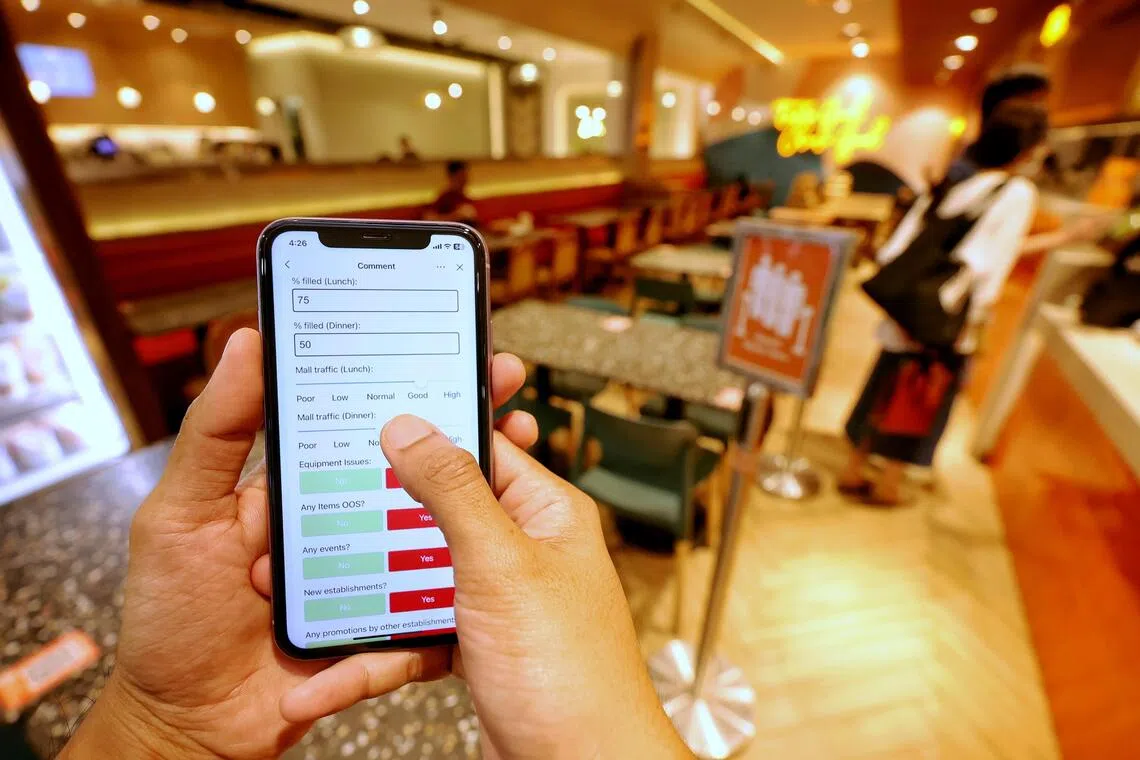
The Soup Spoon taps AI to better manage its outlets.
ST PHOTO: KEVIN LIM
Home-grown soup chain The Soup Spoon is using AI to make sense of daily operations across its 30 halal-certified outlets. This allows for more efficient management and quicker solutions for issues that arise at the outlet level.
The company now relies on AI to process reports, analyse patterns and highlight areas that need attention.
Managing director Andrew Chan, who has a degree in information systems, says the company began using AI in March to process and summarise daily reports from its outlets.
The reports combine structured data such as sales figures with unstructured input from outlet managers, who log details such as weather conditions, foot traffic and manpower issues at the end of each day.
“The reports help us make sense of sales and the issues that contribute to better or falling performance,” says Mr Chan, without the need for senior staff to visit the outlet physically.
The system was built as an app within the company’s existing Lark Suite – an enterprise collaboration platform by technology company ByteDance, using workflow automation platform N8n – which combines AI capabilities with business process automation.
The Soup Spoon’s sales database can be connected to an AI engine – GPT-5 on the OpenAI platform – to generate daily summaries, which are shared with outlet managers and senior management. Overall, the entire system costs about $5,000 in monthly subscriptions.
The goal, says Mr Chan, is to help the system highlight key issues and assign them to the right departments. For instance, training gaps identified from outlet reports are sent to the learning and development team for follow-up. If sales dip because of rain, the system notes it, but flags it as a natural factor rather than a cause for concern.
“Resources are limited, so we want the AI to help us prioritise and focus on what really needs fixing,” he says.
Outlet manager Muhammad Jamsyir Aniq, 26, who runs the branch at Kallang Wave Mall, says the new system has made his workday more efficient.
“Before, we had monthly meetings that lasted two or three hours. Now, they take about an hour because we already have the data summarised in the reports,” he says. “I can spend more time focusing on operations and serving customers.”
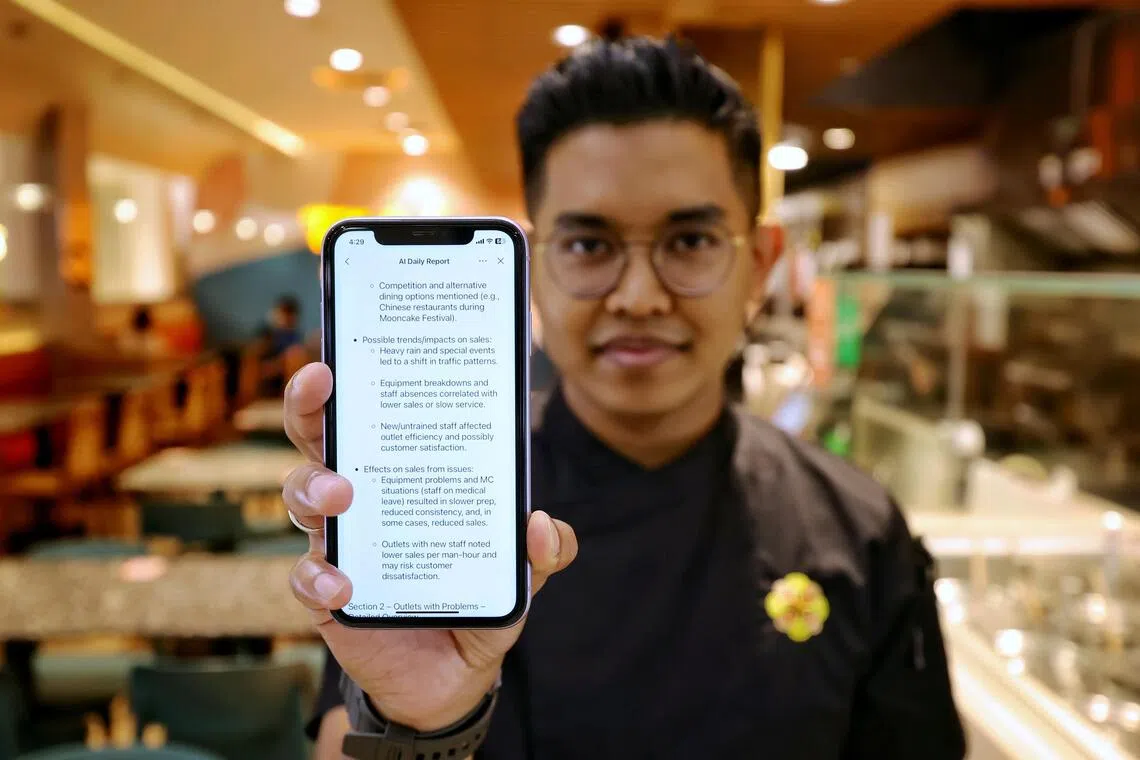
Mr Muhammad Jamsyir Aniq, manager of The Soup Spoon Union at Kallang Wave Mall, with a report generated by the AI engine from the data he keyed in via the mobile phone.
ST PHOTO: KEVIN LIM
Mr Chan says the chain’s digitalisation efforts, including the use of AI, have made operations at least twice as efficient.
“Without digitalisation, we would need significantly more resources to run the organisation,” he adds.
The company also plans to extend AI to its customer-facing systems in mid-2026, through its Souperholic loyalty app. The goal is to personalise recommendations and health-related features based on previous orders and nutritional data.
“The next phase will be about hyper-personalisation,” says Mr Chan. “AI allows us to make operations smoother, decisions quicker and customer experiences more meaningful.”
ChefGenie: AI-cooked meals around the clock
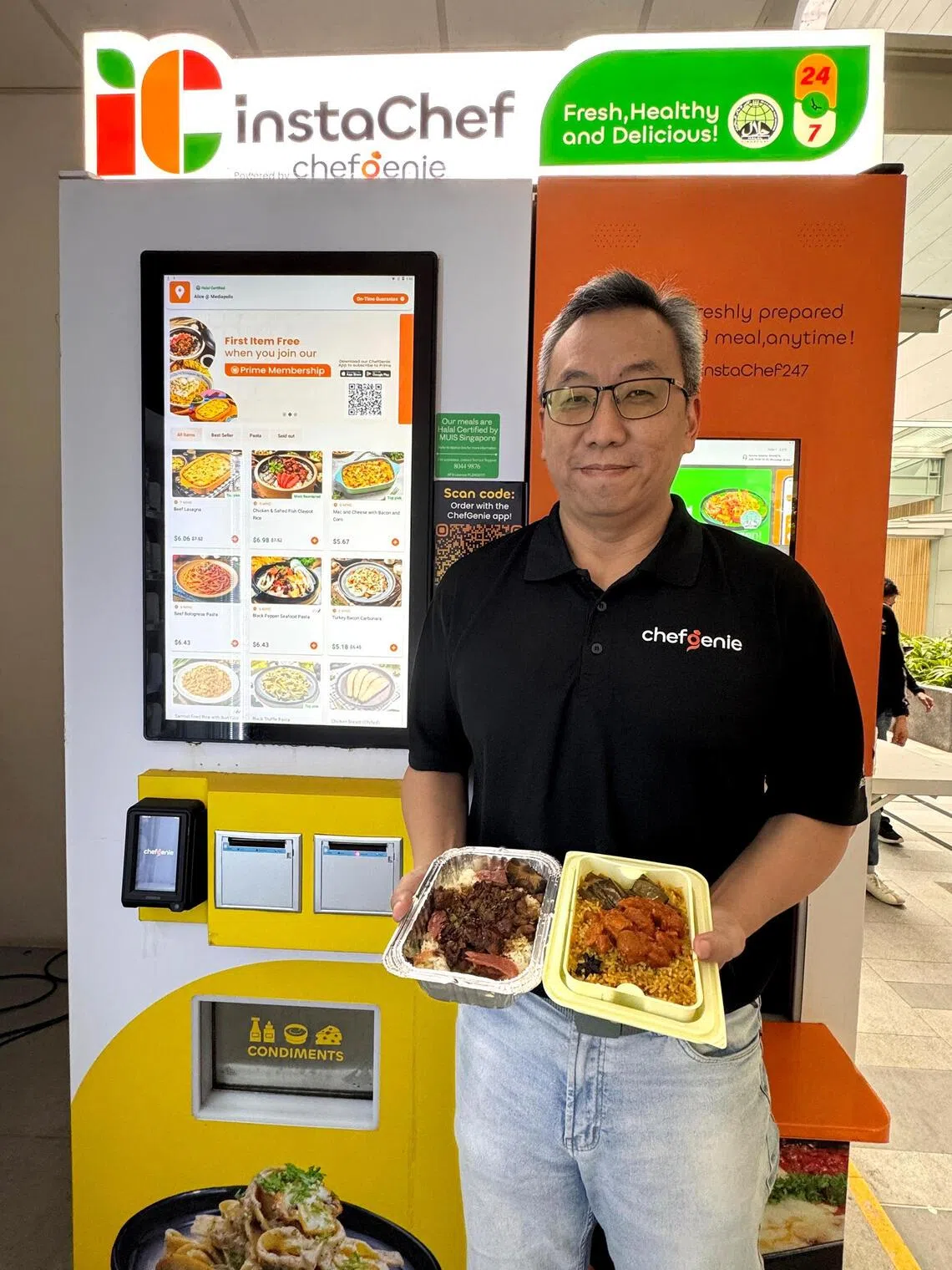
Mr Sky Goh, vice-president of business and operations at Aikit, the company behind AI-powered vending kitchen ChefGenie.
PHOTO: CHEFGENIE
At the Singapore Institute of Technology’s campus in Punggol, students and members of the public can order chicken briyani or murtabak from a vending machine. These are not reheated frozen food, but meals prepared by an AI-powered autonomous kitchen called ChefGenie.
Launched in September 2025 by home-grown food technology firm Aikit, ChefGenie is designed to prepare restaurant-quality meals around the clock.
The pilot, supported by Enterprise Singapore, features six vending kitchens offering a range of local and international dishes, including signature items from heritage partner Springleaf Prata. Each ChefGenie can prepare about 20 dishes, with ingredients replenished daily. Prices range from $5 to $9.
“The F&B industry has always faced a tough balance between keeping food quality high and managing rising manpower and rental costs,” says Mr Sky Goh, vice-president of business and operations at Aikit.
“ChefGenie was born out of this reality. By automating the repetitive, technical side of cooking, we allow chefs and brands to focus on what truly matter – great food and a great experience for customers.”
ChefGenie uses AI to control heat, timing and technique for every dish, ensuring each one matches the chef’s original recipe. Parcooked meals and ingredients are stored in sealed portions which are chilled, then cooked using induction technology when ordered. This preserves the taste, texture and aroma of freshly prepared food.
At the same time, AI analyses sales and consumption data at each location to optimise replenishment and reduce waste.
Replenishment of ingredients is carried out daily or every two days, depending on each location’s demand and menu rotation. The AI system monitors stock levels, sales trends and shelf life in real time, automatically alerting the logistics team when replenishment is required. This ensures every meal served is fresh, safe and consistent in quality.
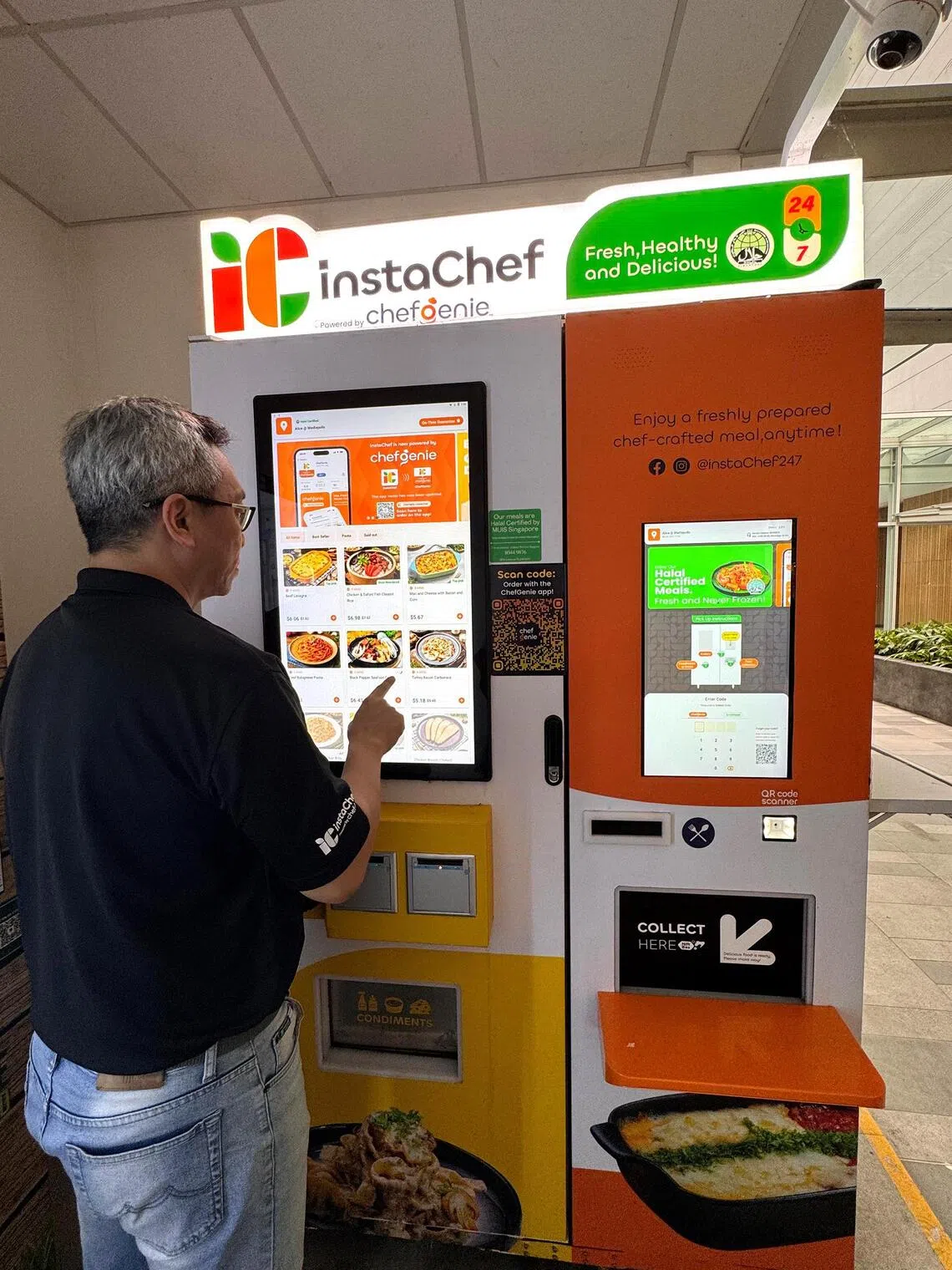
ChefGenie uses induction technology to prepare meals.
PHOTO: CHEFGENIE
Mr Goh points out that ChefGenie creates a more sustainable operating model for brands. Instead of investing heavily in new outlets, they can deploy compact, autonomous kitchens in high-demand areas such as campuses and offices, and reach customers around the clock.
Currently, there are 120 ChefGenie vending kitchens deployed islandwide. The list of locations can be found on the ChefGenie app.
One of the first F&B brands to come on board was Springleaf Prata, founded by Mr S.V. Gunalan, 51, in 2003. The chain, which operates 14 outlets islandwide, adapted four dishes – Portobello Mozarella Prata With Curry Chicken ($12), Chicken Biryani ($7.63), Vegetarian Biryani ($7.60) and Chicken Murtabak with Fish Curry ($8.40) – for the ChefGenie platform.
“The project sounded like a fun and interesting campaign for us,” says Mr Gunalan. “At Springleaf, we believe in trying out new things, and we felt that the ChefGenie plan was a feasible one.”
He adds that while the dishes are not identical to those served at Springleaf outlets, diners have responded well, with chicken briyani being the bestseller.
The adaptation process took about four months, with multiple rounds of testing to fine-tune texture and consistency. For example, curry had to be made thicker, with less water used.
Mr Gunalan says the collaboration has helped extend Springleaf’s reach and visibility, especially among customers looking for late-night dining options.
“We believe this collaboration will introduce such platforms into the mainstream and influence how machines can be implemented and developed in the local F&B scene,” he says.
Kopitiam @ Mapletree Business City: AI-powered foodcourt dining
Right at the entrance of Kopitiam’s outlet at Mapletree Business City, diners are greeted by Kimberly, a friendly AI avatar on a display screen, that helps them navigate stalls and find seats, and even recommends what to eat.

Kimberly is an interactive AI avatar designed to make dining smoother and more intuitive.
PHOTO: KOPITIAM
The foodcourt is Singapore’s first to feature an AI-powered dining system.
Lead for business support Aaron Chia says the Mapletree Business City outlet was chosen for the pilot, which started in August, because it sits within a tech-savvy community that includes Google, Samsung Electronics and Novartis.
“We felt this was a good place to start, as many customers here would appreciate the new features,” he says.
Kimberly is designed as a digital concierge, capable of conversing in multiple languages and dialects, including English, Mandarin, Cantonese, Malay, Tamil, Japanese and Korean.
“Foodcourts attract a diverse mix of diners,” says Mr Chia. “By enabling Kimberly to communicate in multiple languages and dialects, we ensure that she reflects Singapore’s multicultural identity and can connect naturally with diners in the language that they are most comfortable with. It is a way of keeping the kopitiam spirit – of being warm, local and people-oriented – alive even in a digital form.”
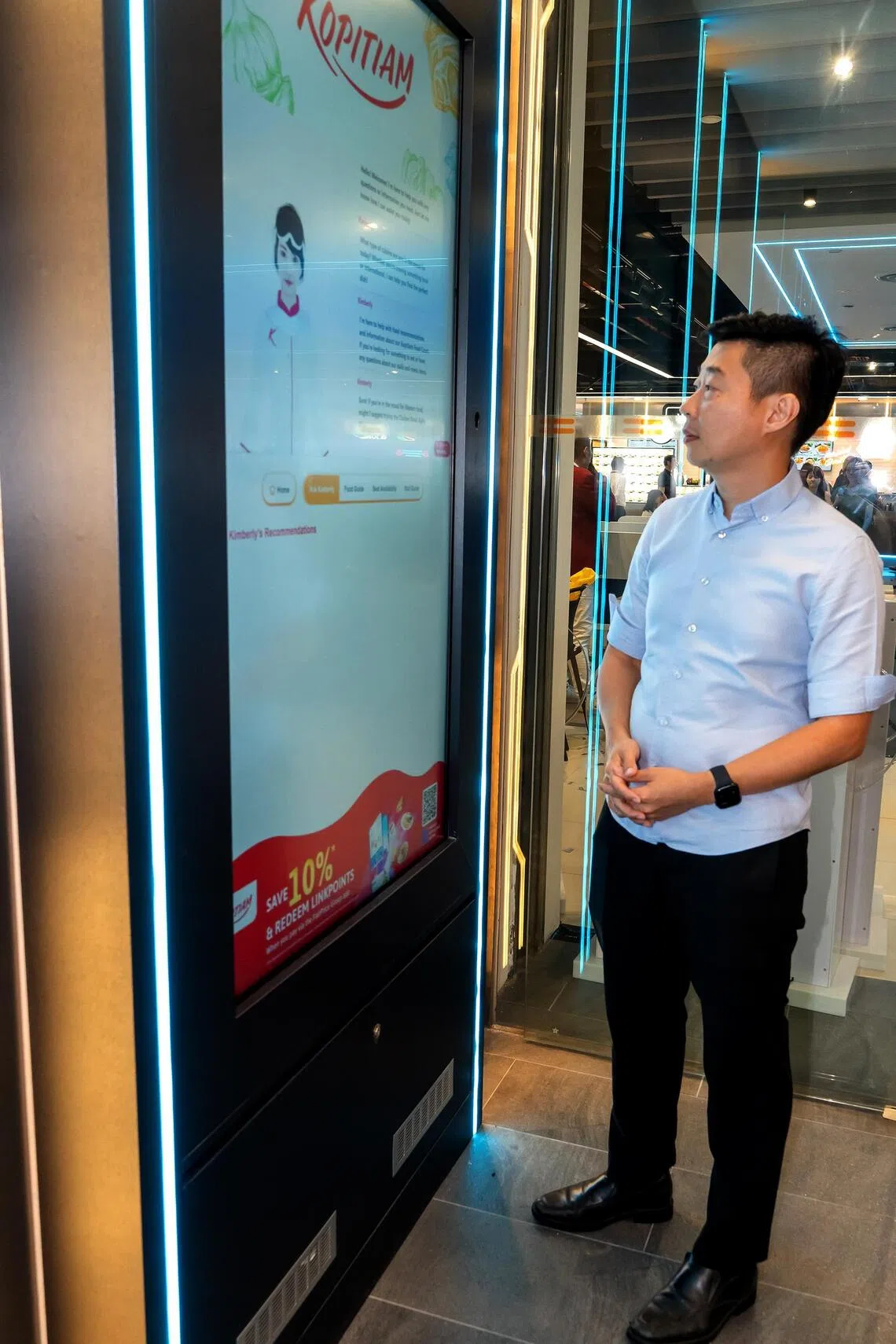
Kimberly provides real-time assistance, helping diners locate available seating through a live heat map and discover dishes or stalls that match their preferences via a digital screen.
PHOTO: KOPITIAM
Linked to a live heat map, Kimberly helps diners locate available seating during peak hours. She also offers dish suggestions, and information on stalls and current offers.
Beyond Kimberly, the foodcourt integrates several hygiene-focused and digital features. Ultraviolet-sterilising cutlery caddies keep utensils sanitised after cleaning, while touchless handwashing stations reduce contact. Overhead screens display scenes of nature, such as swaying trees or swimming fish, creating what the team describes as an outside-in dining experience.
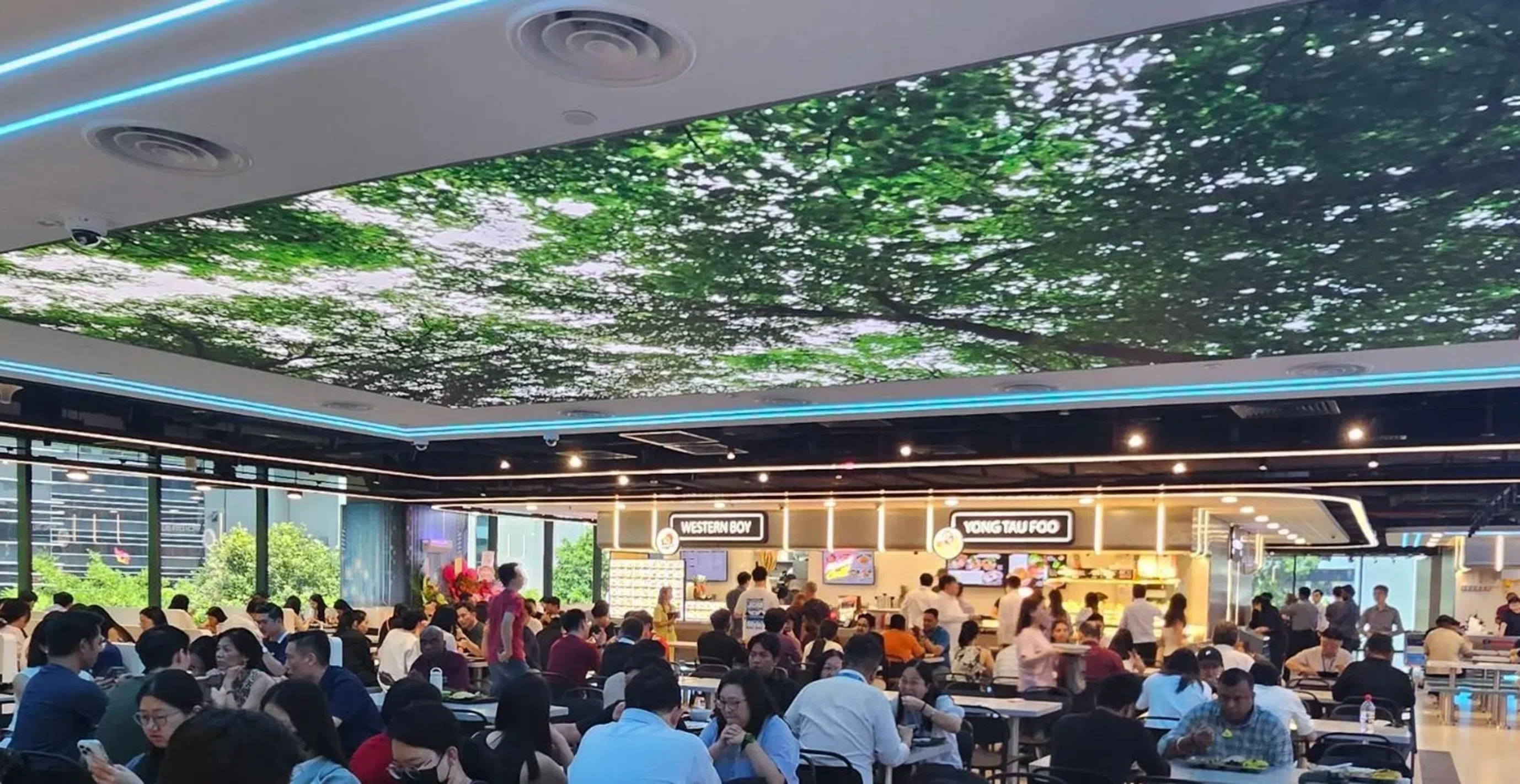
Kopitiam @ Mapletree Business City has a large overhead screen that displays nature scenes for a dynamic ambience.
PHOTO: KOPITIAM
Kopitiam also uses AI-powered video analytics to map footfall, monitor tray returns and identify busy zones at this foodcourt. Insights from these systems help allocate staff more efficiently and maintain cleanliness throughout the day. Stallholders benefit from gaining visibility into customer patterns, enabling better manpower and service planning.
“Diners have shared that they enjoy Kimberly’s friendly personality and the novelty of interacting with an AI avatar that responds to their needs,” says Mr Chia. “Many have found the seat availability feature especially useful during peak hours, while others appreciate receiving quick recommendations when undecided about what to eat.”
Kopitiam expanded the AI system to its VivoCity outlet in September.
“Technology is a tool to enhance, not replace, the human experience,” says Mr Chia. “Our approach is to integrate AI in ways that complement the warmth of traditional hawker culture. Technology enhances convenience, hygiene and efficiency, while stall owners and staff remain central to the dining experience.”


